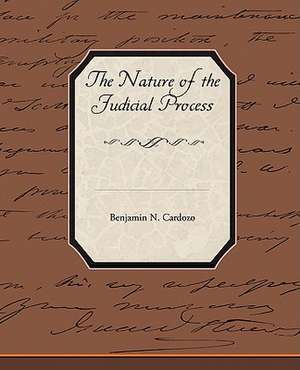The Nature of the Judicial Process
Autor Benjamin N. Cardozoen Limba Engleză Paperback – 13 mar 2009
| Toate formatele și edițiile | Preț | Express |
|---|---|---|
| Paperback (8) | 59.48 lei 3-5 săpt. | |
| CREATESPACE – | 59.48 lei 3-5 săpt. | |
| Martino Fine Books – 18 mai 2011 | 98.06 lei 38-44 zile | |
| COSIMO CLASSICS – 31 iul 2009 | 102.87 lei 6-8 săpt. | |
| Quid Pro, LLC – 3 feb 2016 | 108.39 lei 6-8 săpt. | |
| Quid Pro, LLC – 31 iul 2010 | 111.50 lei 6-8 săpt. | |
| Book Jungle – 13 mar 2009 | 119.99 lei 6-8 săpt. | |
| Book Jungle – 7 iun 2009 | 137.71 lei 6-8 săpt. | |
| Yale University Press – 10 sep 1960 | 259.16 lei 6-8 săpt. | |
| Hardback (1) | 184.79 lei 6-8 săpt. | |
| Quid Pro, LLC – 28 feb 2011 | 184.79 lei 6-8 săpt. |
Preț: 119.99 lei
Nou
Puncte Express: 180
Preț estimativ în valută:
22.96€ • 24.05$ • 19.03£
22.96€ • 24.05$ • 19.03£
Carte tipărită la comandă
Livrare economică 08-22 aprilie
Preluare comenzi: 021 569.72.76
Specificații
ISBN-13: 9781438513966
ISBN-10: 1438513968
Pagini: 188
Dimensiuni: 191 x 235 x 10 mm
Greutate: 0.33 kg
Editura: Book Jungle
ISBN-10: 1438513968
Pagini: 188
Dimensiuni: 191 x 235 x 10 mm
Greutate: 0.33 kg
Editura: Book Jungle
Descriere
Descriere de la o altă ediție sau format:
Featuring a new, explanatory Foreword by Justice Cardozo's premier biographer, this renowned and much-used analysis of the process of judicial decision-making includes embedded page numbers from the original 1921 edition for continuity of citations and syllabi.
Featuring a new, explanatory Foreword by Justice Cardozo's premier biographer, this renowned and much-used analysis of the process of judicial decision-making includes embedded page numbers from the original 1921 edition for continuity of citations and syllabi.
